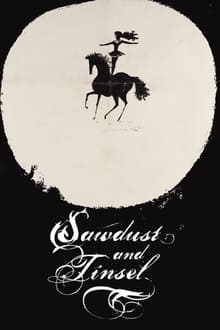
That life is a circus that one cannot escape from is the overriding theme of Ingmar Bergman's 1953 film Gycklarnas afton ("The Evening of the Clowns", but released in the English-speaking world under the titles "Sawdust and Tinsel" and "The Naked Night"). As the film opens, a circus is on its way to a provincial Swedish town in the early 20th century. In an introductory sequence, a coachman tells a story of an embarrassing episode for one of the clowns and his wife, which introduces the motif of humiliation that runs throughout the film. In the ensuing flashback scene, the characters' mouths move but we cannot hear what they are saying, a tribute to silent-era director Sergei Eisenstein.
Only then do we get to the main plot: circus director Albert (Åke Grönberg) will use the opportunity of revisiting this town to see his wife and children, whom he abandoned three years before. His mistress Anne (Harriet Andersson) gets jealous and wants to leave the circus, so she lets a local actor (Hasse Ekman) seduce her. The climax of the film comes with the circus performance, where all the tensions boil over, but not quite in the way I expected.
This is not a mature Bergman film. Anyone expecting the great depths of his later efforts, those powerful meditations on God and interpersonal relationships, will probably be disappointed by this fairly straightfoward melodrama. The symbolism is too heavyhanded and even with a mere 90-minute running time, the film seems too long for what it has to offer. I never expected to get from Bergman a long, drawn-out scene where a overstressed character sweats and swoons for what seems like forever... and then that same kind of scene is repeated again later.
Nonetheless, there are some things to enjoy here. Anders Ek's performance is the most memorable here. His supporting role is as a clown with very distinctive physical gestures. It's a huge contrast to the severe priests he went on to play in two later Bergman films. One wonders if his funny way of moving his mouth inspired the buck-teethed drunks of Saturday Night Live's "Bill Brasky" skits. The music for the film was composed by Karl-Birger Blomdahl, who ultimately gained a reputation as Sweden's most controversial avant-garde composer, but here offering a score rather in the vein of Hindemith, full of references to popular dances that capture the riotous and vulgar fun of the circus performers and townspeople.
It’s an interesting historical trivia that before Criterion released a DVD, the film was unavailable in the United States and known only for its original run in cinemas, where the American distributor sold it as a salacious smut film. I'm frankly baffled by this, and the 1950s must have been a very repressed era. While Harriet Andersson plays a sex kitten as times, and her entire role comes down to her looks, the eroticism is not that intense.